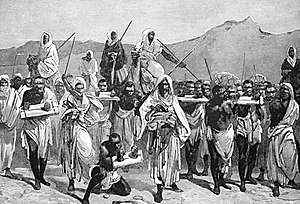
Back تجارة العبيد العابرة للصحراء Arabic Comercio transahariano de esclavos Spanish Transsahariska slavhandeln Swedish

| Part of a series on |
| Forced labour and slavery |
|---|
 |
The trans-Saharan slave trade, also known as the Arab slave trade,[1][2][3][4][5][6][7][8] was a slave trade in which slaves were mainly transported across the Sahara. Most were moved from sub-Saharan Africa to North Africa to be sold to Mediterranean and Middle Eastern civilizations; a small percentage went in the other direction.[9]
Estimates of the total number of black slaves moved from sub-Saharan Africa to the Arab world range from 6 to 10 million, and the trans-Saharan trade routes conveyed a significant number of this total, with one estimate tallying around 7.2 million slaves crossing the Sahara from the mid-7th century until the 20th century when it was abolished.[10][11] The Arabs managed and operated the trans-Saharan slave trade,[12] although Berbers were also actively involved.[13]
Alongside Black Africans, Turks, Iranians, Europeans and Berbers were among the people traded by the Arabs, with the trade being practised throughout the Arab world, primarily in Western Asia, North Africa, East Africa, and Europe.[14]
- ^ Fluehr-Lobban, Carolyn (1990). "Islamization in Sudan: A Critical Assessment". Middle East Journal. 44 (4): 610–623. ISSN 0026-3141. JSTOR 4328193.
- ^ Johnson, Willard R. (1980). "Africans and Arabs: Collaboration without Co-Operation, Change without Challenge". International Journal. 35 (4): 766–793. doi:10.2307/40201914. ISSN 0020-7020. JSTOR 40201914.
- ^ Stanziani, Alessandro (2018), "Bondage across the Ocean: Indentured Labor in the Indian Ocean", Bondage, Labor and Rights in Eurasia from the Sixteenth to the Early Twentieth Centuries (1 ed.), Berghahn Books, pp. 175–203, doi:10.2307/j.ctt9qcm9z.11, ISBN 978-1-78238-250-8, JSTOR j.ctt9qcm9z.11, retrieved 11 September 2024
- ^ Shepperson, George (2006). "Islam in Central Africa: a historiographical document". The Society of Malawi Journal. 59 (2): 1–5. ISSN 0037-993X. JSTOR 29779209.
- ^ Reilly, Benjamin (2015), "Arabian Agricultural Slavery in the Longue Durée", Slavery, Agriculture, and Malaria in the Arabian Peninsula (1 ed.), Ohio University Press, pp. 123–152, doi:10.2307/j.ctt1rfsnxf.10, JSTOR j.ctt1rfsnxf.10
- ^ Mazrui, Ali A. (1975). "Black Africa and the Arabs". Foreign Affairs. 53 (4): 725–742. doi:10.2307/20039542. ISSN 0015-7120. JSTOR 20039542.
- ^ Hasan, Yusuf Fadl (1977). "SOME ASPECTS OF THE ARAB SLAVE TRADE FROM THE SUDAN 7th — 19th CENTURY". Sudan Notes and Records. 58: 85–106. ISSN 0375-2984. JSTOR 44947358.
- ^ Bean, Frank D.; Brown, Susan K. (1 March 2023). Selected Topics in Migration Studies. Springer Nature. p. 27. ISBN 978-3-031-19631-7.
Trans-Saharan slave trade was conducted within the ambits of the trans-Saharan trade, otherwise referred to as the Arab trade. Trans-Saharan trade, conducted across the Sahara Desert, was a web of commercial interactions between the Arab world (North Africa and the Persian Gulf) and sub-Saharan Africa.
- ^ Bradley, Keith R. "Apuleius and the sub-Saharan slave trade". Apuleius and Antonine Rome: Historical Essays. p. 177.
- ^ Segal 2001, p. 55-57.
- ^ Clarence-Smith, William Gervase (2006). Islam and the Abolition of Slavery. Oxford University Press. pp. 11–12. ISBN 978-0-19-522151-0. OCLC 1045855145.
- ^ Ayittey, George (1 September 2006). Indigenous African Institutions: 2nd Edition. BRILL. p. 450. ISBN 978-90-474-4003-1.
While the Europeans organized the West African slave trade, the Arabs managed the East African and trans-Saharan counterparts.
- ^ Badru, Pade; Sackey, Brigid M. (23 May 2013). Islam in Africa South of the Sahara: Essays in Gender Relations and Political Reform. Scarecrow Press. p. 54. ISBN 978-0-8108-8470-0.
- ^ Akinbode, Ayomide (20 December 2021). "The Forgotten Arab Slave Trade of East Africa". The History Ville. Archived from the original on 6 December 2023. Retrieved 1 January 2024.